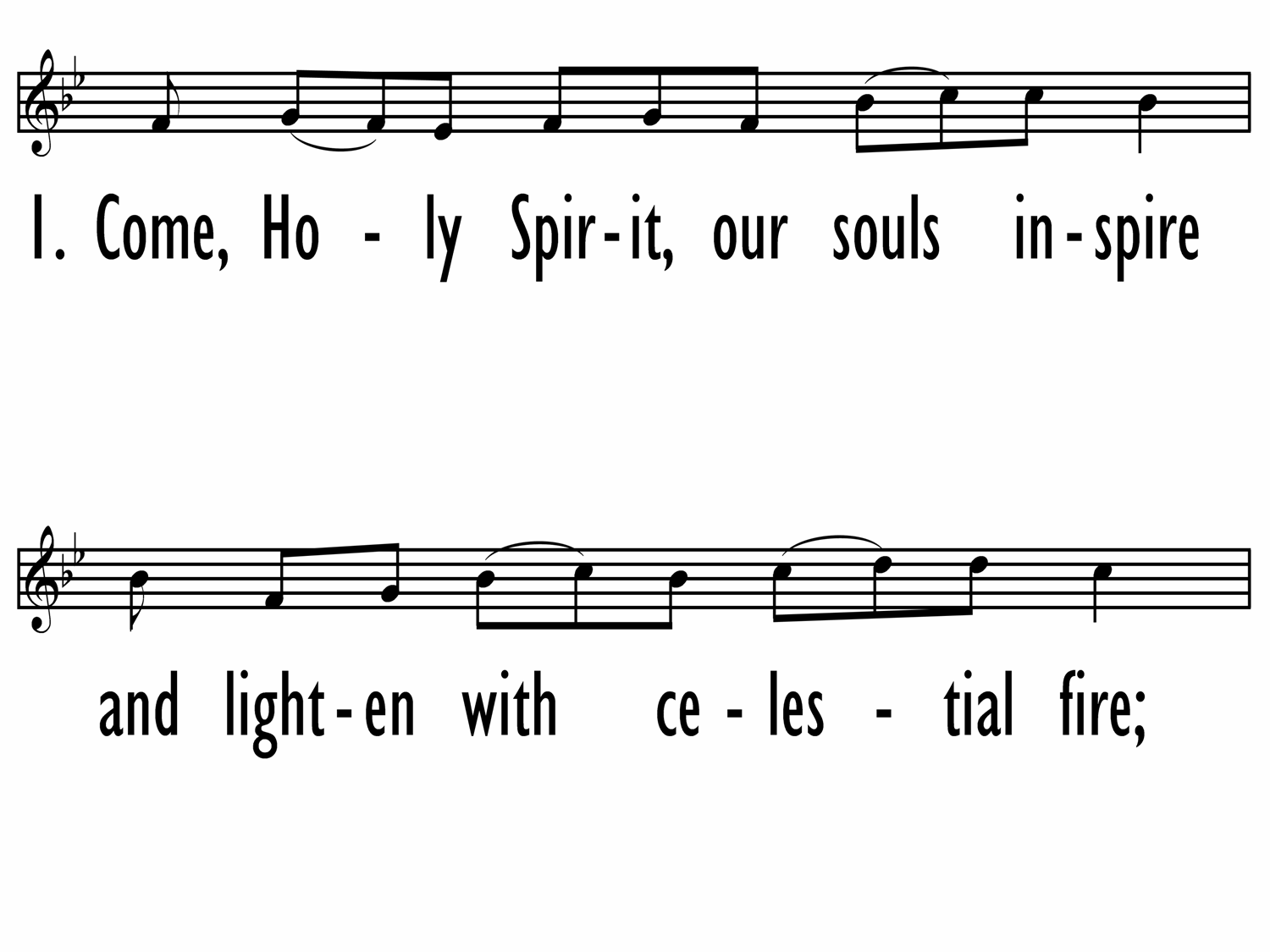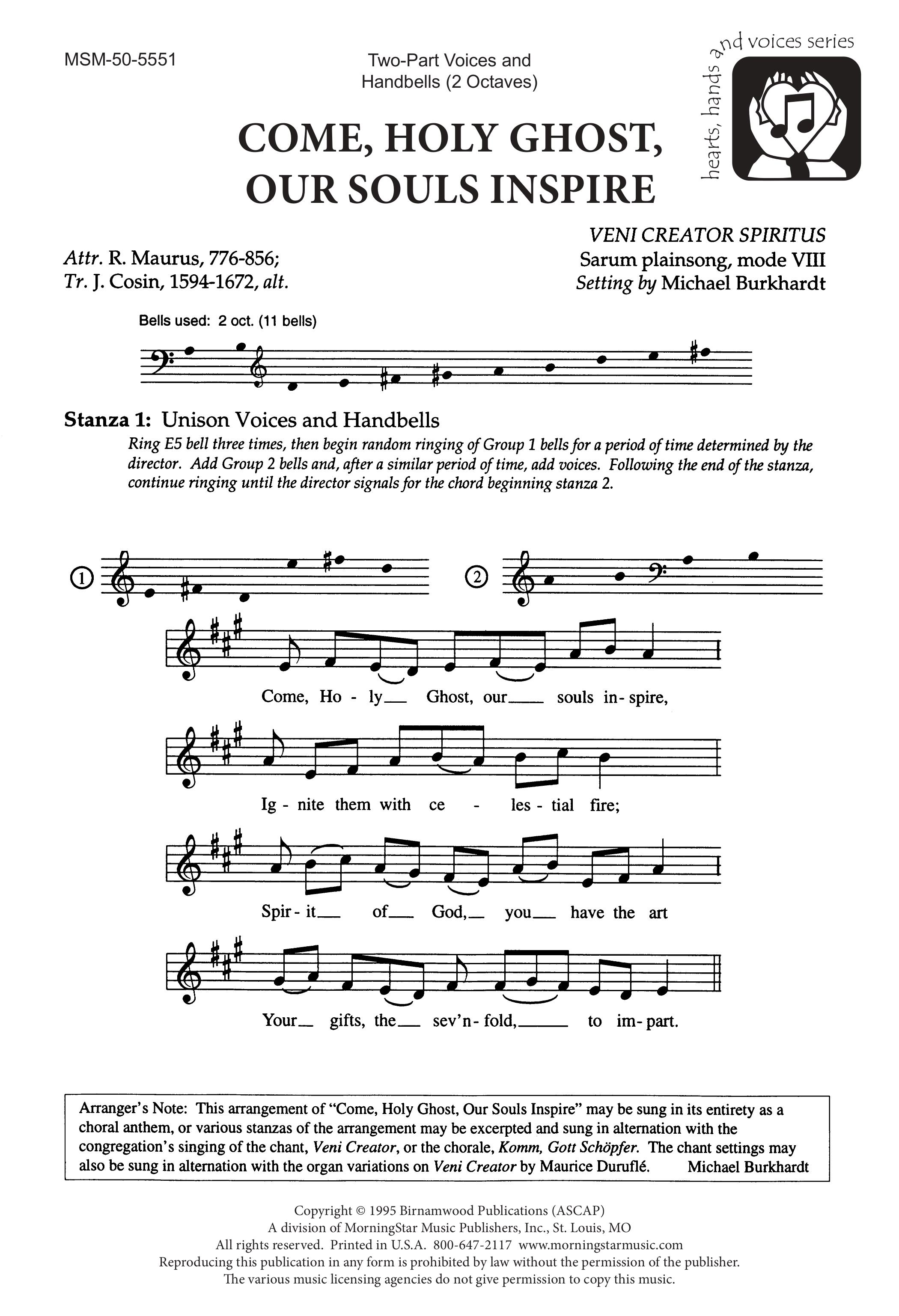- |
User Links
Come, Holy Spirit, Our Souls Inspire
Hymn Information
- First Line
- Come, Holy Spirit, our souls inspire
- Author (attributed to)
- Rabanus Maurus, 9th c.
- Translator
- John Cosin (1627, alt.)
- Tune Name
- VENI, CREATOR SPIRITUS
- Arranger
- Healey Willan, 1880-1968
- Tune Source
- Plainsong Mode VIII
- Topic
- Holy Spirit · Church Year: Pentecost
Copyright Information
- Text Copyright
- Public Domain
- Tune Copyright
- Arr. © the Estate of Healey Willan
- Reprint/Projection Information
- Words: The Words are in the Public Domain; you do not need permission to project or reprint the Words.
- Music: Please contact the copyright holder for permission.
Full Text
Scripture References
- · · · · · ·
Confessions and Statements of Faith References
Further Reflections on Confessions and Statements of Faith References
It is difficult to isolate certain confessional themes in each song about the Holy Spirit. Rather, there are several themes that are woven together in nearly all of these songs. The Holy Spirit is identified as one with the Father and the Son in the Holy Trinity; we plead for the coming and indwelling of the Spirit in our lives; the Spirit’s work is evident in creation and in God’s people throughout redemptive history; the Spirit calls and empowers the church for mission; and the Spirit is the source of power, fruit, and hope. These themes are expressed in confessional statements such as these:
- Heidelberg Catechism, Lord’s Day 20, Question and Answer 53 testifies, “…the Spirit, with the Father and the Son, is eternal God.” In addition, the Spirit “makes me share in Christ and all his benefits, comforts me, and will remain with me forever.”
-
Our World Belongs to God has helpful references to these multiple themes of the Spirit’s work and ministry.
- “Jesus becomes the baptizer, drenching his followers with the Spirit, creating a new community where Father, Son and Spirit make their home” (paragraph 28)
- “The Spirit renews our hearts and moves us to faith… stands by us in our need and makes our obedience fresh and vibrant” (paragraph 29).
- “God the Spirit lavishes gifts on the church in astonishing variety…equipping each member to build up the body of Christ and to serve our neighbors.”
- “The Spirit gathers people from every tongue, tribe and nation into the unity of the body of Christ” (paragraph 30).
- “Men and women, impelled by the Spirit go next door and far away…pointing to the reign of God with what they do and say” (paragraph 30).
- Our Song of Hope also contributes very clearly regarding the Spirit’s work:
-
“The Holy Spirit speaks through the Scriptures…has inspired Greek and Hebrew words, setting God’s truth in human language, placing God’s teaching in ancient culture, proclaiming the Gospel in the history of the world” (stanza 6).
- “The Holy Spirit speaks through the church, measuring its words by the canonical Scriptures…has spoken in the ancient creeds, and in the confessions of the Reformation” (stanza 7).
- “The Spirit sends [the church] out in ministry to preach good news to the poor, righteousness to the nations, and peace among all people” (stanza 16).
- “The Holy Spirit builds one church, united in one Lord and one hope, with one ministry around one table” (stanza 17).
- The Spirit calls all believers in Jesus to respond in worship together, to accept all the gifts from the Spirit, to learn from each other’s traditions, to make unity visible on earth” (stanza 17).
-
“…The Spirit works at the ends of the world before the church has there spoken a word” (stanza 20).
Come, Holy Spirit, Our Souls Inspire
Call to Worship
Confession
Assurance
Blessing/Benediction
Additional Prayers
Come, Holy Spirit, Our Souls Inspire
Tune Information
- Name
- VENI, CREATOR SPIRITUS
- Key
- B♭ Major
- Meter
- 8.8.8.8
Come, Holy Spirit, Our Souls Inspire
Hymn Story/Background
Author Information
With German historians Hrabanus is regarded as the father of the modern system of education in that country. His prose works were somewhat numerous, but the hymns with which his name is associated are few. We have the "Christe sanctorum decus Angelorum”; “Tibi Christe, splendor Patris”; and the "Veni Creator Spiritus”; but recent research convinces us that the ascription in each case is very doubtful; and none are received as by Hrabanus in Professor Dümmler's edition of the Carmina of Hrabanus in the Poetae Latini aevi Carolini, vol. ii. 1884. Dümmler omits them even from the "hymns of uncertain origin."


 My Starred Hymns
My Starred Hymns







